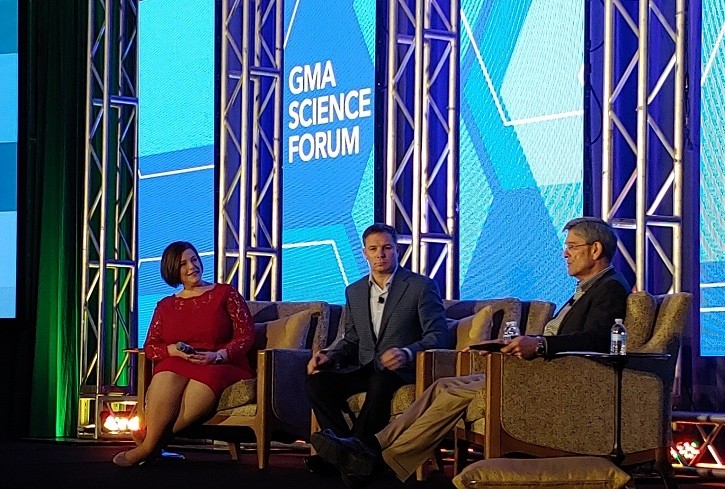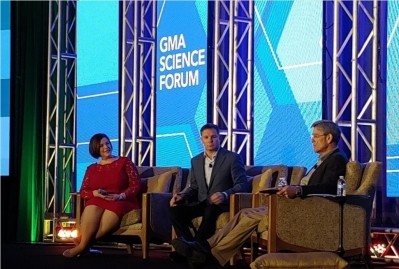GMA’s new leadership outlines four pillars for rebuilding and recreating the beleaguered association

At the association’s annual Science Forum in Washington, DC, last week, GMA’s new President and CEO Geoff Freeman and new Senior Vice President of Science and Technology Betsy Booren laid out a broad, if still somewhat vague and in flux, strategy for “refreshing, reorganizing and recreating GMA.”
A top priority of that strategy will be first rebuilding industry’s trust in GMA and as an extension consumers’ trust in industry, Freeman said.
“We as an industry, as consumer packaged goods, to a certain degree have lost trust” and part of that is due to GMA traditionally “playing the game where things were done in the dark of night in smoke filled rooms,” which “is not how it works anymore,” Freeman said.
“The old sneaky way of industry trying to pull one over on people – that is gone and I don’t think that is what our industry’s intentions were … because I see what [members companies] do from a marketing and business perspective – you are giving consumers whatever information they want. No industry is adapting more quickly to consumer interest than this industry,” Freeman said.
And yet, he added, “for whatever reason, our advocacy left the assumption out there, and we allowed the NGOs that were on the other side of some of the issues, to somehow position us as having interests that were distinct from the consumer. That couldn’t be further from the truth. But shame on us for letting it get to that point.”
With that context, Freeman said, “recognizing that trust is our ultimate goal going forward, we need to think about how to shape our messaging, shape our policy positions and shape how we move forward on a lot of these issues” so individual members as well as GMA “are so proud that you are willing to go on CNBC and defend it.”
Four pillars of a new GMA
As part of the trade group’s efforts to do this, Freeman said GMA will focus on four key pillars: driving “smart uniform regulation,” enhancing packaging sustainability, building a frictionless supply chain and building trust.
In terms of driving uniform regulation, Freeman says that GMA first and foremost wants to move some of the legislative debates playing out at local levels to the national level in order to avoid a patchwork of regulation that will complicate how products are distributed and could limit access.
In addition, he noted, it is important that GMA take an offensive, rather than defensive, position on legislation and regulation.
“So many associations, so many industries, use their Washington group to defend the status quo. That is miserable. There isn’t a status quo. Everything is changing and you are either going to raise change and try to shape change to your benefit, or you are losing,” Freeman said, adding, “Defending the status quo is a strategy to lose slowly.”
Which is not what the new GMA is about, he said.
As far as building trust, Freeman said his team will be working with members and the board to identify what elements are harming trust and which ones could increase trust, and from there GMA will craft a plan to address each.
The third prong of increasing packaging sustainability is an issue that Freeman reports many members said keep them up at night.
“For all the good we do as industry … we have to acknowledge that packaging is a byproduct of the industry. Long after that product is used, there is something left behind. Policy makers are going to do something about that more and more in the future and we can sit back and complain about the crazy ideas they come up with, or we can begin to drive that discussion to reasonable outcomes,” Freeman said.
On that front, he noted, GMA already is working on a field survey that analyzes consumer understanding of recycling and to identify ways industry can boost compliance.
Finally, the association will focus on building a frictionless supply chain starting with the journey from the manufacturing facility to the shelf – whether it is real or virtual, Freeman said.
“What are the frictions in there and in particular, where has government put artificial constraints? Where could government create some new opportunities?” he said.
In addition, he noted, GMA will look at the “huge transportation issues,” including the drive shortage and high freight costs that are impacting all of its members.
A call for unity and teamwork
As GMA pursues these pillars, Freeman notes that not all members will agree with all of the organization’s final policy positions, but he said, he hopes that they will at least understand how those positions were determined and know that they had a spot at the discussion table.
“We are at an inflection point for the organization and have to make a lot of tough decisions, and place some really bold bets based on informed decisions, and take some chances,” Freeman said. To ensure those bets are well placed, he challenged everyone in the association and the industry at large “to be an active partner in [the process of rebuilding GMA] to help us shape what are those bigger issues and bigger opportunities for the industry.”
Many members attending the conference lauded Freeman and other leaders of GMA as “saying all the right things,” but there were lingering questions about whether the association would act in a way that supported the messages it delivered at the conference and questions about how different the pillars really were from GMA’s previous focus areas.
One attendee asked how the association would set concrete priorities given the differences of the diverse membership.
Freeman responded that the strategy will be two pronged. The first prong will be “a lot of listening and a lot of discussions,” such as the seven hour committee meeting he participated in the day before the Science Forum. He also promised that “in the future we will have better processes and structures for this.”
The second prong will be to be decisive and focus on five priorities, all of which might not apply to each member but hopefully three of four will impact each member, he said.
He added that GMA hopes by 2020 to have a new governance structure that will facilitate both listening and making decisions with and for members.










